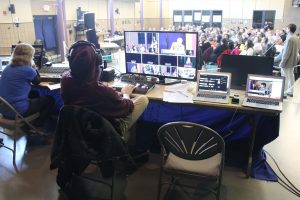Contact: Cor Trowbridge, BCTV Executive Director BCTV, 802-257-0888, cor@brattleborotv.org
For Immediate Release
FCC Action Threatens BCTV’s Future
BRATTLEBORO, VT—November 30, 2018—BCTV today announced that its future and that of similar organizations around Vermont and the country is in serious jeopardy. On September 25, The Federal Communications Commission (FCC) issued proposed rulemaking (Docket 05-311) which, if successful, could allow cable operators to reclassify certain services and charge those against the cable subscriber fees that are collected to fund public access stations in Vermont and across the country.
Cor Trowbridge, executive director of BCTV says, “It’s conceivable that BCTV’s operating funds could be eliminated.” BCTV and like public access stations nationwide could cease to exist,” she said.
Specifically, the proposed FCC rulemaking will allow cable companies to assess the value for ‘in kind’ services related to providing PEG channels and deduct that amount from the Franchise Fees passed to municipalities and nonprofits like BCTV.
These loosely defined ‘in kind’ costs can include the ‘value’ of the cable channels themselves as well as any other services provided. The FCC ruling fails to set any guidelines or limitations to the values that cable companies can assess. According to its press release, the FCC’s stated objective is to “reduce barriers to infrastructure investment.”
Trowbridge and other station managers are concerned that the rule change could put PEG stations out of business and are calling on supporters to take a moment to file comments with the FCC expressing outrage at its proposed actions. Instructions for filing comments are available at brattleborotv.org, BCTV’s website. “Comments” must be filed by December 14 at 11:59 PM.
Lawmakers were quick to respond to the impending loss of vital services the PEG stations provide. In Vermont, both Senators Patrick Leahy and Bernie Sanders have signed onto a letter by Massachusetts Senator Edward Markey to Trump-appointed FCC Commissioner Ajit Pai. The October 29 letter objects to the fact that the proposal would “alter, at the cable operators’ discretion, the terms of the local franchise agreements,” thereby putting “at risk critical funding for public, education, governmental stations, as well as broadband connections to schools and other public buildings.”
Other senators signing the letter include Sens. Tammy Baldwin, D-Wisc.; Maggie Hassan, D-N.H.; Ben Cardin, D-Md.; Jeff Merkley, D-Ore.; Gary Peters, D-Mich.; Ron Wyden, D-Ore.; Richard Blumenthal, D-Conn.; and Elizabeth Warren, D-Mass.
BCTV and stations like it provide transparent coverage of local government meetings, educational matters and community events, coverage that is available nowhere else. BCTV also provides equipment and training that allow community members to create content, reaching viewers on cable channels 8 and 10 and online. BCTV’s staff and volunteers produce over 1200 hours of original local content each year. BCTV was named winner of the Overall Excellence Award from the Alliance for Community Media in 2016 and again in 2018.
Brattleboro, Guilford and Vernon receive BCTV’s signal via Comcast Cable, while residents of Dummerston, Jamaica, Newfane, Putney and Townshend receive BCTV via Southern Vermont Cable. BCTV’s channels reach 6,000 subscriber households. Currently BCTV relies on cable revenues for 85% of its annual budget, or $250,000.
According to the Museum of Broadcast Communications, public access television is one of the most exciting and democratic U.S. media developments perhaps ever. The rationale for public access television was that, as mandated by the Federal Communications Act of 1934, the airwaves belong to the people, that in a democratic society it is useful to multiply public participation in political discussion, and that mainstream television severely limited the range of views and opinion. Public access television, then, would open television to the public. It would make possible community participation, and thus would be in the public interest of strengthening democracy.
The term “Public, Educational and Governmental (PEG) Access” was officially adopted by the federal government in its Cable Communications Act of 1984, which, by building upon what was already fairly well established in cabled communities around the country, allowed local cable franchising authorities to require cable operators to set-aside one or more of their cable television channels to non-commercial, nonprofit local programming, and also to house, equip and fund these operations.
“The future of public access is uncertain and with it a critical venue for the people and communities to participate in our democracy,” adds Trowbridge.
###








